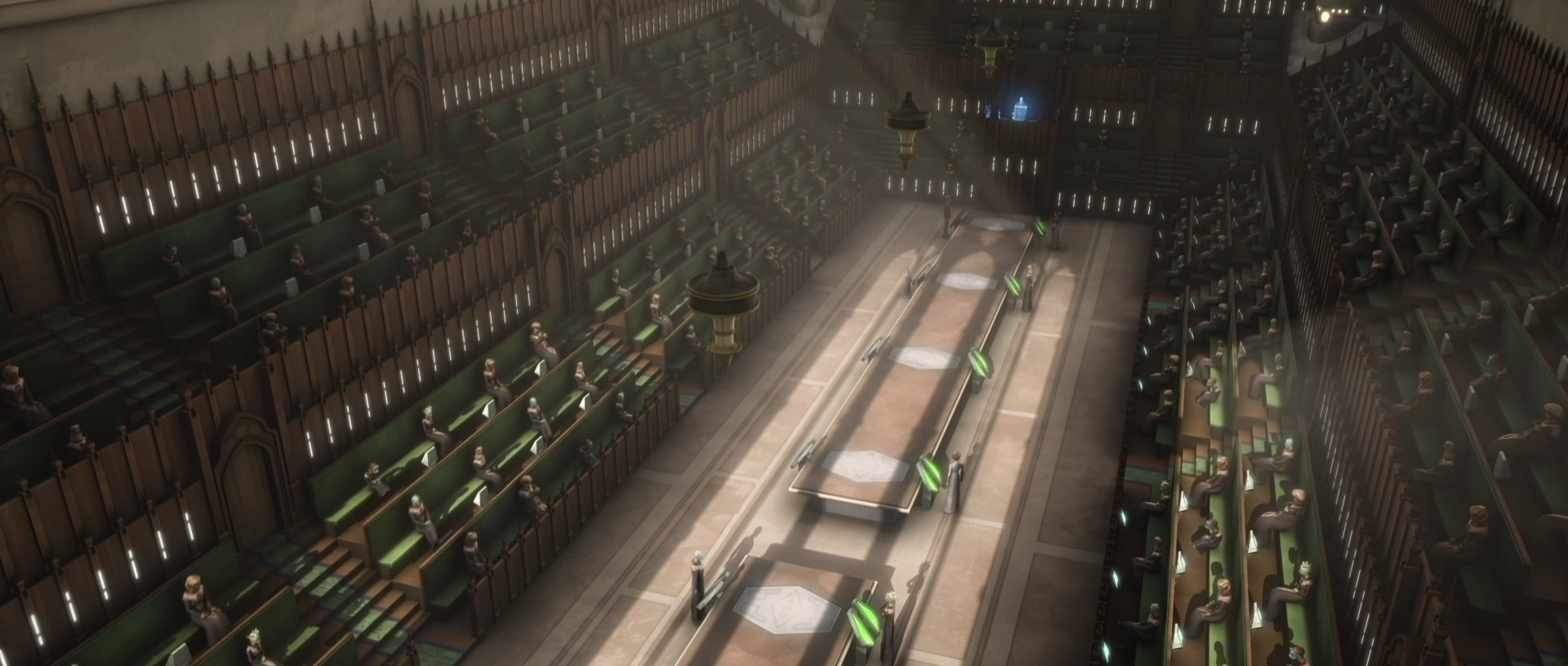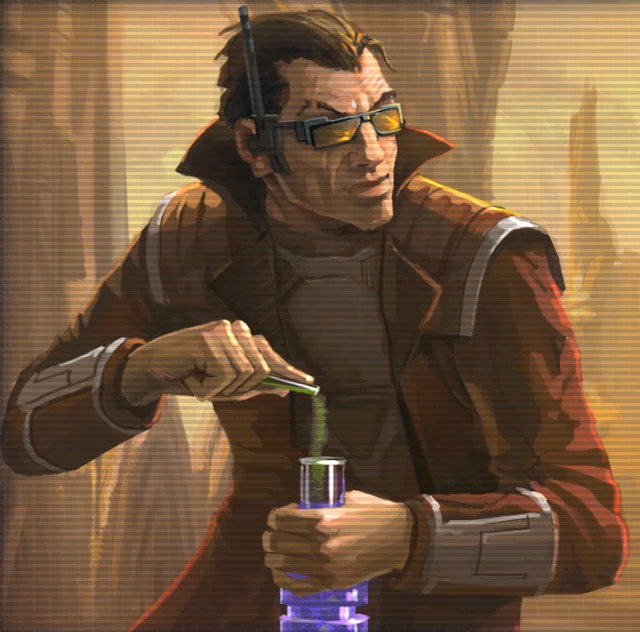Palace of Joy (An. 45/ GSC 3794)
A shiny beetle of mass proportions skirts through the neon clouds of
Soil-Dark-As-Night. Buzzes softly to a landing zone outside a queer monolithic place. Old stones form a canvas on which advanced technology creates a strange cubic artistic network of scientific progress. The belly of the chrome creature opens with an eerie hiss that has the crowds of pilgrims anxiously curled into balls as they taste the air for danger.
Stepping out are legged creatures encased in a shells of ballistic resistant polyethylene plates with a nanofiber membrane underneath. Each carries a sharpened arm long blade on one hip and a pistol on the other, with a light titanium shield on one arm. An emblem of an impossibly beautiful person; scales perfect from head to tail, but with leathery wings; adorns many of them in red and black hues. There are four of these strange bipeds in such adornment. A fifth steps out in skins it seems to be trying to shed: a darker outermost layer, a band around the midsection, some sort of flap around the neck, a layer around their unsettling legs, and a soft and pale innermost layer of shedding exoskeleton. This one’s form is more petite than the others yet they obey its orders.
Greeting them are long reptilian creatures slithering out of spherical vehicles. The more petite legged creature glances to her four guardians with some hesitation. The reptilians are two: one whose scales are in concentric bands of vivid yellow and haunting green; the other of muted brown with a speckle pattern from some scales being a snowy white. Their tongues extend out, as long as one of the legged creature’s legs, then retract in.
The petite legged creature keeps its legs straight while motioning its head and torso downward. A series of noises escape its mouth, “Salutations fair hosts. I am Amanda Kowiski of Atlantis.”
The yellow and green serpent responds in a bad simulation of the Knights’ language, expelled in one long sigh from its elongated mouth. “Peace be unto you, Knight Kowiski of Atlantis. This one’s name is unimportant as she speaks for the Court of the Oracle.”
Amanda Kowiski straightens her posture once more. A breeze makes strands of her dirt colored head-fur wisp about, exciting the crowd of onlookers into uncurling and standing at their full body-lengths. “Then will you be our gracious escorts to said Court of the Oracle?”
The yellow and green diplomat pivots on her tail to hiss for a disconcertingly long time into the ear of the larger, more predatory looking brown speckled serpent with the white belly. The white-belly hisses some sort of response, never taking its eyes off of Kowiski, until finally the diplomat turns back to the Knight delegation and responds in a halting version of their tongue once again. “Yes of course, please SǂeᎡachkᏠna this way.” In the middle of the sentence the metallic ring around the yellowscale’s tail emitted an electronic buzz.
A mist of petals wafted throughout the room over towering vine covered pillars. The vaulted ceiling was dominated by a massive relief of a mandala made of copper engraving. The artistry depicted no representations of creatures or history, only geometric patterns. Amanda Kowiski entered with two of her guardians, they maintained their shields and blades yet the pistols were left behind for amnesty. An aroma similar to hibiscus and honey made a kind oppressive wave over the emissaries. Natural light shot throughout the area creating a sense of awe, for it was indeed equal parts wondrous and terrifying. Wonder of the accomplishment, and terror of the unknown.
No steps were present anywhere, only ramps and branched pillars to facilitate serpentine movements. The main stone ramp into the throneroom led down into what appeared to be an immense garden of sand and stones, stretching out in front of a raised throne. At first the court seemed empty but upon closer inspection hundreds of pairs of eyes and tongues peered and tasted from beneath the sand, warmed by sunlight from strategically placed windows. The sand was in fact the “seating” place of the royal court. Atop the formation of stone pillars the throne was a beautiful thing of gold and lacquered wood, dominated by enormous cushions and surrounded ornaments of jewels and feathers. Seated on the cushion, looming over the royal court, was the being that was doubtless the Oracle who had invited the Knights here.
It was an albino, snowy white scales and red eyes coiled among the cushions, tail wrapped around one of the stone pillars, with a brass bell tied to the tip of the tail by ribbon. A hot breeze came as the being spoke in the same sigh-like language the serpents had used earlier. This time the yellowscale translator was nowhere to be seen, instead blue lights from a concealed device beamed a holographic screen into the air in front of the Knights, converting the spoken alien words into comprehensible text in real time.
“The Word is the gate and the Oracle is the path. In the name of God, if you come in peace then speak and be welcome; for you are guests of the Children of the Word.”
The Knight known as Amanda Kowiski did the same strange gesture as before, her torso and head bent forward to face the ground. Upon rising she spoke, “Indeed peace suits the will of progress. My superiors of Atlantis and Dragos wish for trade, and if you would allow us to be so bold, friendship.”
Her hand began to make subtle motions while speaking, “We admit an over eagerness in sending a trade offer without knowing much of your people, yet the Knights of Progress are a very curious and willful number. Many of the Atlantites, the nonknights of the planet, are anxious to learn of your people. Ever since arriving in this new galaxy there has been no shortage of adventure and novelty.”
The Oracle raises off her throne, slowly but surely extending through the air until the serpent’s head is little more than a meter away from the face of the Knight delegation leader, the holographic screen of blue text and images between them. “In your quest for progress, you Knights seek far and wide, do you not? It is right for warriors and helpers to do so, to travel and bring mercy to the weak and punishment to the wicked. But these souls on Atlantis who are not Knights, what could compel such beings to leave their home?”
Pale-green eyes of amber rings around black centers of Amanda glimpsed the floor before gazing back at the great Oracle. “There are,” she forced a cough down, “many reasons. The vast majority of the Atlantite people were starving, their home was in a crisis of food shortages. When the Knights offered to do a, honestly, mad dash through the Duukadli wormhole to find a new home. . .” A pause the length of a heartbeat fills a silent room, “The risk of potentially starving to death was far greater than the risk of dying in amongst unknown stars. I was four solar orbits of our planet old when that happened.”
Amanda Kowiski recomposes herself, “Others were simply curious. I cannot speak well on behalf of other species, yet I can say that us humans have quite a streak of curiosity.” Her hands circle each other, “Moving to a new home is like a rebirth of one’s life. A new home and new life.”
“We have but one home that God granted us, this sacred soil, but we too know what it is like to fail in one life and to be reborn again. This Kingdom is a testament to those who have chosen to be reborn and to teach the Word to others, so that they might free themselves from the endless cycle. If your fathers and mothers rejected immediate…’progress’ in order to help innocent souls along the path of ‘progress’, then that was a worthy way to spend a life.”
“Wise words indeed great Oracle. Now there are many questions between our respective people to be had. In truth, what would you most desire to know or gain from relations with us? If it is resources that is fine, if it is more knowledge that too is sufficient. As stated, we seek progress, which is a hydra.”
“Do not seek to tempt us, child. I am a simple nun/priestess/apostle but I know the ways of the merchant. Let us discuss the oath you propose to our Kingdom.” Another holographic screen appears, this time in what can only be the text of the serpents, and the Oracle appears to read as she continues, going through the terms of the proposed treaty one by one.
“Even a soul that has not heard the Word is entitled to have a scholar of the law of the Word to advocate for them in trial. This is the righteous path and is understood.
Usury is theft and therefore outlawed. This is good and agreed upon.
But you ask us, Knight Kowiski, to allow moneychangers into the temple. If 'human' merchants bring poison to corrupt the spirit of our children or weapons to arm apostates with which to strike down the righteous, the punishment for such a crime is as God demands: death.
How then can we agree to the oath you propose?"
Amanda’s eyes close and lines form above them, a quiet hum escapes her, “hmmmmm,” her eyes smile open with her mouth, “Bequest forgiveness on our ignorance. It is clear trade may not be as viable as initially thought, at least not trade in resources. How would a trade in knowledge suffice, an exchange in histories, codices, and science fair your people? Progress can be created simply through learning and exchanging cultures. If you worry of corruption I’m certain we can negotiate a more controlled environment to mitigate such an event.
“The righteous do not fear the secrets of nature nor the change of artifice. It is not and has never been nature or machines that have been evil, only those who misuse them. Very well, Knight Kowiski. We shall exchange, for a time, some of our scholars for some of yours. So that each might learn. But know these two things: First, every layer your questioners shed of us we shall do the same unto you. Do not pry into things you would not have revealed about yourselves. Second, the Word cannot be traded like some good it is to be spread freely; we demand that you accept food for your people in exchange for what artifice you might teach our own.”
“That seems fair to my ears. We do not intend to preach our interpretations of progress, only to learn more of others. May this decided trade begin to build a bridge between one another.”
iisbroke's op
Madmaritgan's op






















